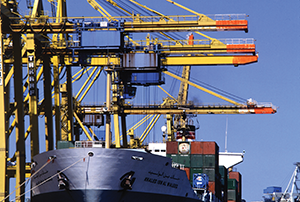Brexit: the local economic impact
Peter Cheney examines Northern Ireland’s economic interests in the EU debate.
£3 billion is the most straightforward number for putting a value on Northern Ireland’s relationship with the EU. That’s the amount earned from manufactured goods sold to other EU member states in 2013-2014, split almost evenly between the Republic and the rest of the union.
As part of the European Union, Northern Ireland has direct access to the world’s largest single market. Our largest continental export markets are Germany, France and the Netherlands. These three countries also represent the UK’s strongest import partners; a regional breakdown of import trade is not available.
It is estimated that a further £96 million in services was exported from Northern Ireland in 2011 (mainly to the Republic of Ireland) but data sources are less reliable than those for manufacturing.
European countries outside the EU purchased £966 million in exports with the majority going to Switzerland (£767 million) – a very high figure perhaps explained by the trade in chemicals, machinery and agricultural products.
Supporters of EU membership tend to focus on exports and maintain that a Brexit will change the terms of trade and disrupt sales for UK businesses. If so, Northern Ireland would be at a greater risk as it exports a higher percentage of its goods to the EU (49 per cent) than the UK as a whole (43 per cent).
Eurosceptics, though, tend to focus on imports and contend that, due to the British trade deficit, the rest of the EU sees the UK as a lucrative trading partner and will therefore negotiate a favourable new deal.
If the UK did leave the EU, it could remain within the European Economic Area which extends the single market to non-member states. However, as it stands, these countries must fully apply EU law on the free movement of goods, people, services and capital. EU standards on transport, competition, consumer protection and company law are also enforced.
Non-EU members, by definition, have only a limited say on EU law. Norway intensively lobbies EU officials at an early stage to ensure that its interests are taken into account. It also contributes around £200 million per year in order to participate in EU programmes and agencies. With its much larger population, the UK would be likely to have more influence than Norway but it would also be expected to make a larger contribution.
Customs controls would be relatively easy to operate at air and sea ports but would prove more difficult on the Irish land border. Goods have to be stamped before they cross the Norwegian border – a relatively straightforward process but still an extra barrier for trade.
It is unclear how a Brexit would affect inward investment from outside Europe. North American firms view the UK as a natural stepping stone into the continent and much will depend on the final terms decided after a ‘yes’ or ‘no’ vote. There is a risk that any uncertainty will encourage investors to move to the Republic or elsewhere in Europe.
Northern Ireland’s dependence on inward investment means that any implications – positive or negative – for those companies will need to be carefully monitored as the renegotiation process gets under way.






